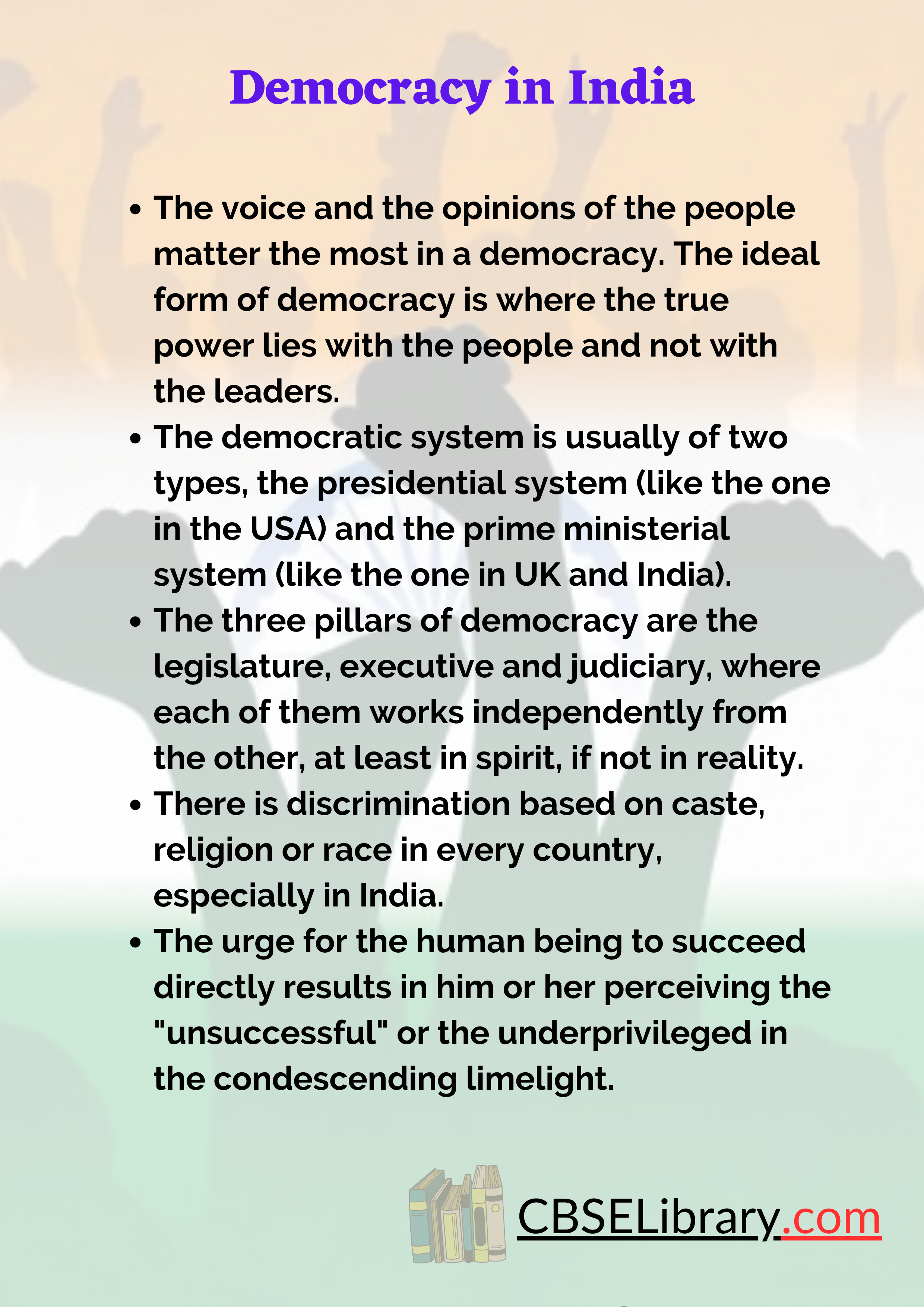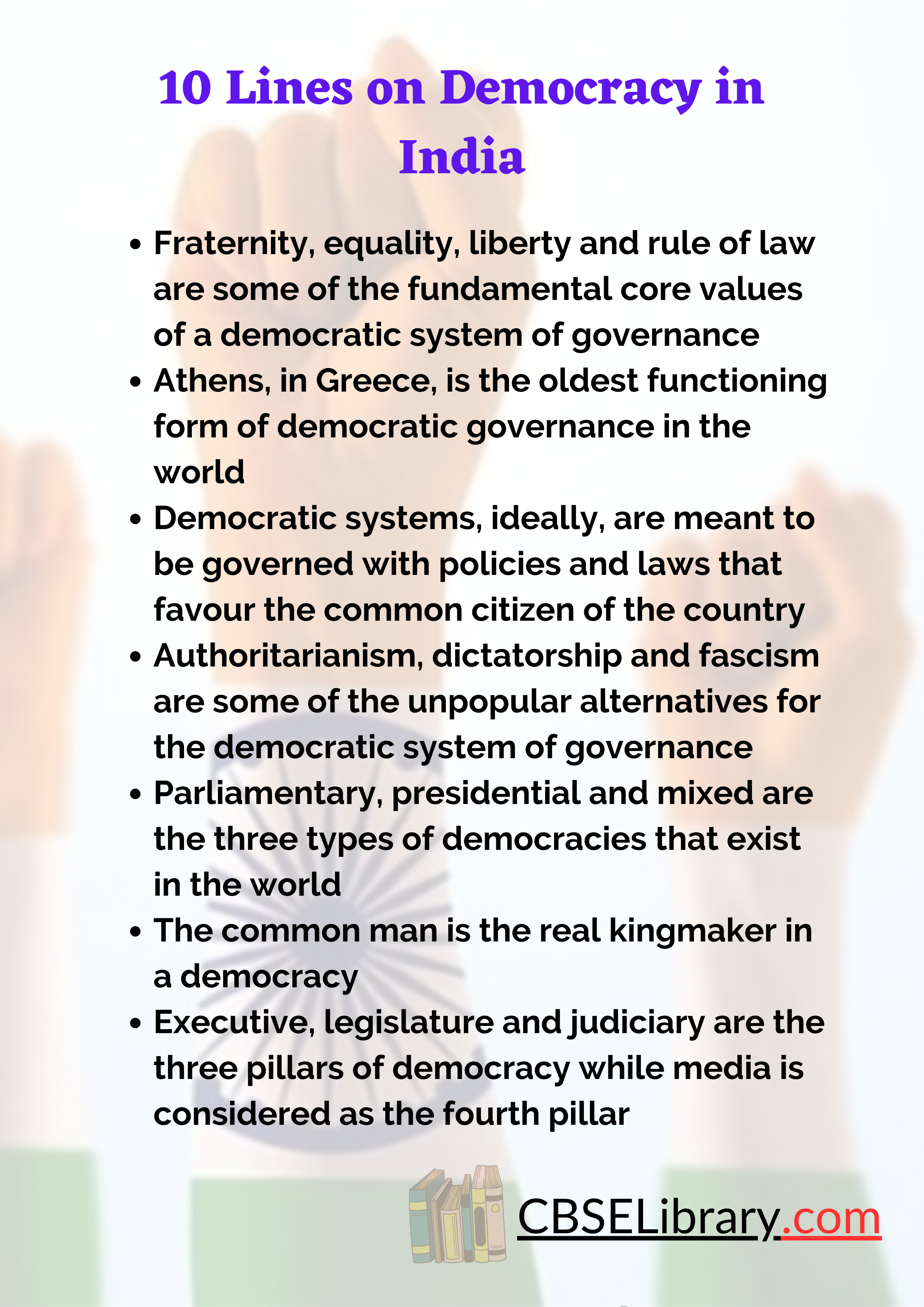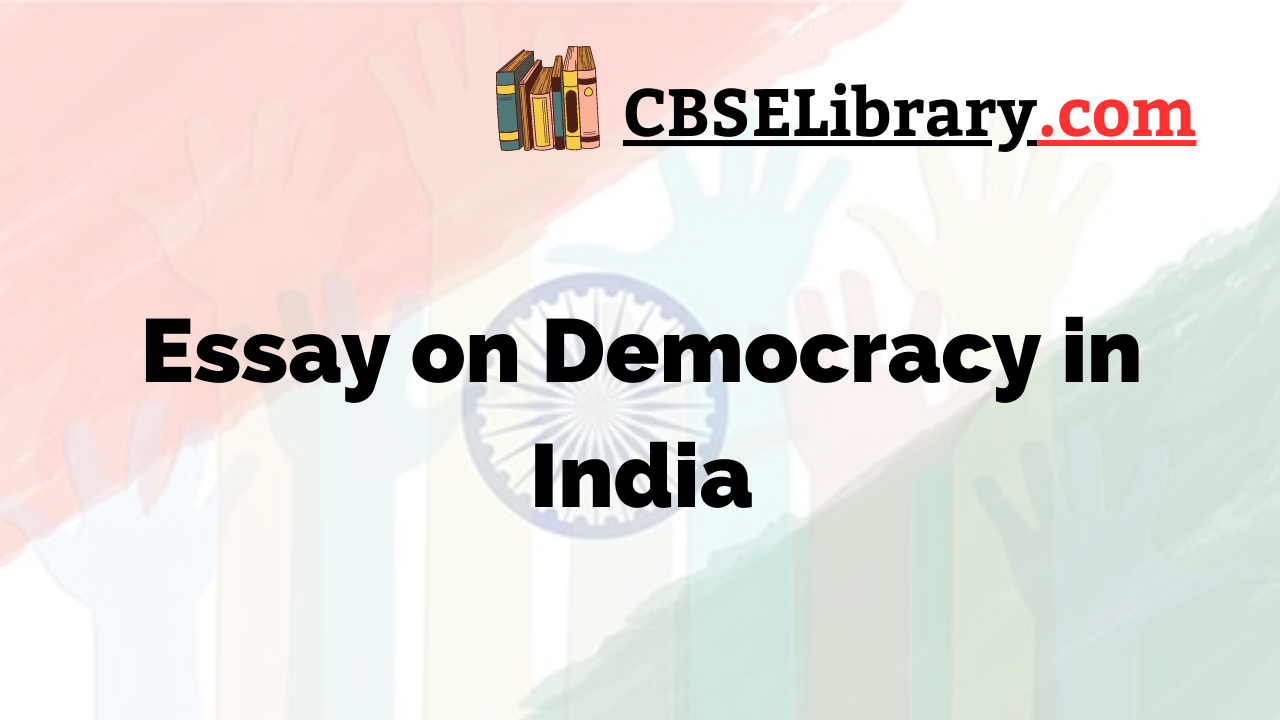Essay on Democracy in India: Of the people, by the people and for the people coined by the great president of the United States of America, Abraham Lincoln represents the core values and principles of democracy. Democracy might not be the best form of governance in the world, but one thing is for sure, there is no alternative for democracy. Sure democracy has its own loopholes and problems, but at the core of this system, it values the qualities of equality and fraternity in society. The alternatives for democracy is authoritarianism, dictatorship or fascism, which at its core, does not guarantee the fundamental freedom and humanitarian values to people.
You can read more Essay Writing about articles, events, people, sports, technology many more.
Long and Short Essays on Democracy in India in English for Students and Kids
In this article, we have provided a long as well as short essay on democracy in India which will be of use for school students in their essay writing, tests, assignments, and project work.
Long Essay on Democracy in India 600 Words in English
The long essay on democracy is suitable for students of classes 7, 8, 9, 10, and competitive exam aspirants.
Democracy is the only known form of governance in the world that promises, in spirit as well, in reality, equality for citizens irrespective of cast creed gender, race or sex. The voice and the opinions of the people matter the most in a democracy. The ideal form of democracy is where the true power lies with the people and not with the leaders. A written constitution is the backbone of democracy through which every aspect of the country is governed. The constitution is the ultimate kingpin in a democratic country.
Debate, delegating, and dissent are the three most important attribute of a democratic system. The democratic system is usually of two types, the presidential system (like the one in the USA) and the prime ministerial system (like the one in UK and India). But the core values in both systems remains the same which are justice, equality, diversity, sovereignty, patriotism and the rule of law. Refer to another essay on democracy in India where each of the terms is explained in detail.
The three pillars of democracy are the legislature, executive and judiciary, where each of them works independently from the other, at least in spirit, if not in reality. Journalism or media is popularly known as the fourth pillar of democracy. If all the core values and systems of democracy are followed in its true form, a democratic system will truly be the best form of the systems of governance in the world. But the reality is far from the truth.
The equality and justice we talk about in the democratic system of governance hardly prevail across all spectrums. There is discrimination based on caste, religion or race in every country, especially in India. The financially challenged section of people are discriminated in every sphere of life, in the worst case, they are not even awarded the basic dignity of life. But why does this happen? why is it that achieving equality is such a herculean task for countries? Well, the answer lies with the basic tendencies, characteristics and idiosyncrasies of human beings. Elitism is one of the reasons why inequality prevails.
The urge for the human being to succeed directly results in him or her perceiving the “unsuccessful” or the underprivileged in the condescending limelight. Secondly, the capitalist economy that we follow allows each person to indulge themselves in a mad rat race to make money and achieve materialistic success. And the one on the bottom of the graph is seen as less by the ones on the top of the same graph. The caste system that prevails in India is also another contributing factor for inequality in the country.
In the subsequent part of this essay on democracy in India, we are going to give a substantial solution for certain prevailing problems.
How to achieve a perfect democracy?
Firstly it depends on the definition of a” perfect democracy” because different counties have different agendas and priorities and different definitions for democracy and developments. Here is an option that countries should explore to maintain the core values of a democratic system as previously mentioned in this essay on democracy in India.
Free and Fair Elections
One of the most celebrated and important parts of a democratic system of any country is its elections. This is the only time where the true and unfettered power lies with the people. An election symbolises that the people’s voices and opinions matter above anything else. And it is the fundamental duty of every citizen to cast his or her vote without fail.
In case they don’t vote at all, then morally they don’t have any right to question the governments and their policies. But not everything is hunky-dory as it should be. The rigging of elections, threatening of candidates, fake votes, missing ballots are some of the factors that are harming the objectives of elections. Governments should come up with stricter policies in place so that free and fair elections take place. Election, which is the first step of democracy, if in itself is corrupt, then the vision of achieving a truly democratic system will be flawed.

Short Essay on Democracy in India 200 Words in English
We have provided below a 200-word short essay on democracy in India for school and college test, homework, project work, case study and assignment for students. The short essay on democracy is suitable for students of classes 1,2,3,4,5,and 6.
To quote Winston Churchill, the late Prime Minister of UK during the 1940s “Democracy is the worst form of governance, except for all others”. This statement reflects the thought that there is no alternative to democracy. It can be considered as a necessary evil for the human race. Democracy is a form of governance that allows even the poorest of the poor and the underprivileged of a country to become the leader of the same country. It is the perfect and fitting answer for hierarchical, nepotism and authoritarian form of governance where the leaders are appointed on the basis of a bloodline. In a democracy, leaders are not appointed but elected through majoritarianism and the love and support of the people. Some of the most successful democracies are also the most developed ones, such as India, USA, Germany, UK, NewZealand or Australia in contrast with authoritarian counties that are relatively struggling to develop and progress, such as North Korea, Libya, Egypt, etc.
The legislature, executive, judiciary and the media are the four fundamental pillars of democracy on which the country stands. Impairment in any one of the pillars will directly or indirectly affect the other three. These pillars are the self-appointed gladiators and guardians of the core values of democracy which are life, liberty, equality, fraternity, rule of law, diversity, sovereignty and patriotism.
10 Lines on Democracy in India Essay
- The common man is the real kingmaker in a democracy
- Executive, legislature and judiciary are the three pillars of democracy while media is considered as the fourth pillar
- A free and fair election is a basic step and necessity in a democratic system
- The public elects their representatives, who ideally should be the voice and eyes of the common man
- Fraternity, equality, liberty and rule of law are some of the fundamental core values of a democratic system of governance
- Athens, in Greece, is the oldest functioning form of democratic governance in the world
- Democratic systems, ideally, are meant to be governed with policies and laws that favour the common citizen of the country
- Authoritarianism, dictatorship and fascism are some of the unpopular alternatives for the democratic system of governance
- Parliamentary, presidential and mixed are the three types of democracies that exist in the world
- Democracy and republic are the two forms where the true power lies with the common citizens of the country

FAQ’s on Essay on Democracy in India
Question 1.
Which is the oldest democracy in the world?
Answer:
Tynwald, on the Isle of Man, is considered to be the oldest democracy in the world that dates back to the 9th century
Question 2.
What is the difference between democracy and authoritarianism?
Answer:
In a democracy, leaders are answerable and accountable to their people but that is not the case in authoritarianism
Question 3.
Which is the largest democracy in the world?
Answer:
With a population of 135 crore people, India is the largest functioning democracy in the world
Question 4.
Which country is considered as the best democracy in the world?
Answer:
With a strong democratic score of 9.87, Norway is considered as the best and strongest democratic system in the world.
